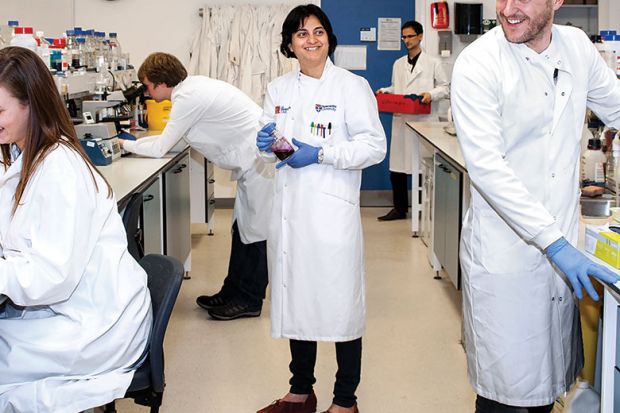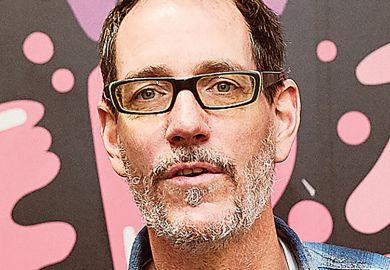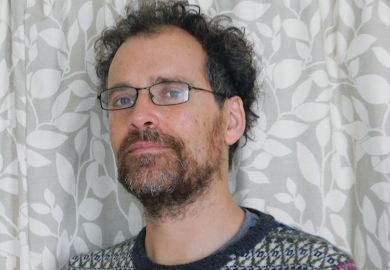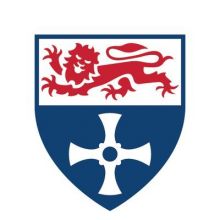Muzlifah Haniffa is professor of dermatology and immunology at Newcastle University and an associate faculty member at the Wellcome Sanger Institute, near Cambridge. Last month she received the Foulkes Foundation Medal, which is awarded by the Academy of Medical Sciences to a rising star in biomedical research. She holds a medical degree from University of Wales College of Medicine (now part of Cardiff University), a diploma in epidemiology from the London School of Hygiene and Tropical Medicine and a PhD from Newcastle.
Where and when were you born?
Penang, Malaysia in 1973.
How has this shaped who you are?
My parents made it clear that education and hard work would be important for my future success. My mother used to take me and my siblings to the British Council and Penang state libraries every weekend, where I discovered many new worlds from reading books. I loved books on astronomy and later quantum physics, communicating a vastness and sense of adventure that appealed to me.
You arrived in the UK as a medical student. Do you recall your first impressions of university life in Wales?
The closest I’d come to experiencing the UK climate was sticking my arm in my kitchen freezer in Malaysia, so had to learn the elaborate vocabulary for the winter clothing I’d never worn. Nor did I have any shared cultural reference points with other medical students, which made it hard to understand and contribute to social conversations. But we learned the language of medicine together, which created a bond. I’m still filling in the blanks when it comes to British culture and society, learning as much as my children from the reading books they bring home from school.
What kind of undergraduate were you?
Bookish, curious and reasonably chilled out.
What’s your most memorable moment at university?
My now-husband teaching me how to swim at the age of 20.
You were made a professor within 10 years of gaining your PhD. What advice would you give to other female scientists aiming to do the same?
If someone like me can do this, so can you.
Dame Athene Donald has spoken about unconscious bias faced by female scientists. Do you recognise this problem?
Sadly women are often judged on preconceived ideas of scientific merit and leadership that are often closely aligned to male attributes. Even when they become successful scientists, women are stereotyped – with critics focusing on what they wear or the pitch of their voice. I once heard a man commenting on a picture of Ada Lovelace that “she does not look like a programmer”. No one would remark that Isaac Newton “did not look like a scientist” because male scientific leaders have been visible for centuries. When it comes to publication, too, women often lose out by being more circumspect about their discoveries or providing a less ambitious narrative for their findings. But having more women as thought leaders in science, reviewers and editors will diversify the qualities on which we judge excellence.
You've been involved with the Human Cell Atlas, which aims to provide an open access map of every cell in the human body. How do you see the open science movement evolving over the next decade?
The Human Cell Atlas uses a collaborative community-based approach to bring together scientific, medical and industry communities, and the discoveries made so far using open-data sharing have been immense. For instance, our most recent effort was decoding how the immune system develops before birth, which hitherto has been a black box. We then provided the data through a browsable web portal, so other researchers can enhance their understanding of specific diseases. Researchers are beginning to realise that open science will enhance and benefit everyone’s research and accelerate the clinical translation of this knowledge. I have no doubt open science will become the norm in the future. The scale of discovery open team science can deliver to benefit the community would be difficult to achieve with one man or woman and their own lab.
The Human Genome Project was a scientific success but has been criticised for not leading to medical treatments. Does the Human Cell Atlas project face the same risk?
Some of the major translatable discoveries from the Human Cell Atlas include discovering the origin of Wilm’s tumour as aberrant kidney formation. It can potentially be treated by drugs other than traditional chemotherapy. We also understand the ‘natural killer’ cells in the maternal-fetal interface that supports healthy pregnancy and a new cell type, ionocyte, in the lung that plays an important role in cystic fibrosis but has never been targeted in cystic fibrosis treatment. Thanks to its open-data sharing approach, I believe the project will continue to revolutionise science.
Tell us about someone you’ve always admired.
Yasmine Belkaid, an Algerian-born immunologist at the US National Institute of Allergy and Infectious Diseases. As a successful female scientist from an ethnic minority, she taught me the importance of believing in my abilities, being bold and creative and supporting the careers of other young scientists.
What advice would you give to your younger self?
Travel more – I wish I had taken the opportunity to do so during university breaks. I wasted the perfect opportunity to see the world.
What do you do for fun?
Spending time with my two sons – a cuddle with them is the best form of fun.
Do you live by any motto or philosophy?
There is a Malay proverb that translates as “make the most of where you are and do your utmost in all your undertakings”. This is close to my heart.
jack.grove@timeshighereducation.com
Appointments
Ka Yee Lee has been appointed provost of the University of Chicago. Professor Lee, currently vice-provost for research, will take on the new post on 1 February. The professor of chemistry, an expert in membrane biophysics, has worked at Chicago since 1998. Robert Zimmer, Chicago’s president, said that Professor Lee brought to the role “deep and broad experiences at the university, the ability to bring people of varied disciplines and perspectives together, and a clear understanding of the university’s values of academic excellence and rigorous inquiry”.
Stephen Gitahi Kiama has been named as vice-chancellor of the University of Nairobi. He was previously deputy vice-chancellor for human resource and administration, acting deputy vice-chancellor for finance, planning and development, and principal of the College of Agriculture and Veterinary Sciences. Professor Kiama has worked at Nairobi since he graduated in 1990. The university described Professor Kiama as “an accomplished scholar with a track record in formulating and managing academic programmes”.
Harvey Duthie has been selected as vice-president of development at the University of Limerick, and will service as chief executive of the institution’s fundraising arm, the University of Limerick Foundation. He was previously senior vice-president of CCS Fundraising, where he worked with a number of leading higher education institutions.
The University of Birmingham Dubai has appointed David Holloway as director of the LLM in international commercial law and senior lecturer in law, and Olivia Goncalves as deputy director of the foundation psychology programme.
Robert MacIntosh has been announced as the new chair of the Chartered Association of Business Schools. He is the head of School of Social Sciences at Heriot-Watt University.
Register to continue
Why register?
- Registration is free and only takes a moment
- Once registered, you can read 3 articles a month
- Sign up for our newsletter
Subscribe
Or subscribe for unlimited access to:
- Unlimited access to news, views, insights & reviews
- Digital editions
- Digital access to THE’s university and college rankings analysis
Already registered or a current subscriber?






